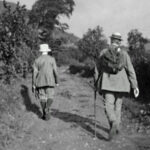Bard Music Festival
Program Seven • The Lark Ascending: British Music for Small Orchestra
August 11, 2023
Bard Music Festival
August 11, 2023


Program Seven celebrates the flowering of British orchestral writing in the first half of the last century. Vaughan Williams was not alone in drawing inspiration from his homeland’s Tudor roots; Warlock’s Capriol Suite is a charming Renaissance dance pastiche, while the final movement of Holst’s St. Paul’s Suite plays on the famous “Greensleeves” melody. Also on the program are works by Elgar, Delius, and under-sung Welsh composer Grace Williams, a star student of Vaughan Williams, who is himself represented by three very different works. Scored for harp and strings, his Five Variants of “Dives and Lazarus” take their modal sonorities from the haunting folk melody that inspired them. Meditative and impressionistic, with pentatonic patterns that set its solo violin free to soar, The Lark Ascending is now in its second decade at the top of Classic FM’s annual audience poll. By contrast, Flos Campi is seldom programmed and persistently misunderstood; scored for solo viola, chorus, strings, and brass, this wordless setting of erotic verses from the biblical Song of Solomon is lush, sensuous, and boldly bitonal.
7:30 pm Preconcert Talk: Imani Mosley
8 pm Performance: Luosha Fang, viola; Bella Hristova, violin; members of the Bard Festival Chorale, James Bagwell, choral director; The Orchestra Now, conducted by James Bagwell and Zachary Schwartzman
Ralph Vaughan Williams (1872–1958)
Five Variants of “Dives and Lazarus” (1939)
Edward Elgar (1858–1934)
Serenade for Strings, Op. 20 (1896)
Ralph Vaughan Williams (1872–1958)
Flos Campi (1925)
Grace Williams (1906–77)
Elegy for String Orchestra (1936, rev. 1940)
Ralph Vaughan Williams (1872–1958)
The Lark Ascending (1914, orch. 1921)
Peter Warlock (1894–1930)
Capriol Suite (1926)
Frederick Delius (1862–1934)
Two Aquarelles (1932)
Gustav Holst (1874–1934)
St. Paul’s Suite, Op. 29, No.2 (1913)
A preview of Vaughan Williams’s Flos Campi, performed by The Orchestra Now, conducted by Zachary Schwartzman; the Bard Festival Chorale, conducted by James Bagwell; and viola soloist Luosha Fang ‘11.
Nearby villages and towns in the Hudson Valley boast a large selection of restaurants, as well as a variety of hotels, motels, inns, and bed & breakfasts.
Eat & StayBard College’s main campus is located in Annandale-on-Hudson (a hamlet of Red Hook), New York, on the east bank of the Hudson River, about 90 miles north of New York City and 220 miles southwest of Boston. The Taconic State Parkway and the New York State Thruway provide the most direct routes to our campus. Click the Google map below, or get directions by entering the following address into your GPS: 60 Manor Avenue, Red Hook, NY 12571.
From the East
If you are traveling from east of the Hudson River in New York State, take the Taconic State Parkway to the Red Hook / Route 199 exit, drive west on Route 199 through the village of Red Hook to Route 9G, turn right onto Route 9G, drive north 1.9 miles, turn left onto Annandale Road, then turn right onto Manor Ave.
From the West
If you are traveling from west of the Hudson River, take the New York State Thruway (I-87) to exit 19 (Kingston), take Route 209 (changes to Route 199 at the Hudson River) over the Kingston-Rhinecliff Bridge to Route 9G, turn left onto Route 9G, drive north 3.5 miles, turn left onto Annandale Road, then turn right onto Manor Ave.
Sosnoff Theater
Accessible Seating
Wheelchair-accessible seating is available in all seating areas for patrons in wheelchairs and their companions. There is an elevator to all levels of the Sosnoff Theater and a wheelchair lift is used to access front-row wheelchair seating.
Wheelchair-Accessible Restrooms
Restrooms at all locations are wheelchair accessible. Single-use restrooms are available at most locations.
All-Gender Restrooms
Bard College and the Fisher Center support guests of any gender identity/expression in using the restroom of their choice. Additionally, all-gender restrooms are available at all venues.
Our driving principle is to operate with a duty of care for all our community—artists, audiences, and staff alike.
In order to share performances with as many audience members as possible, we ask that you read our Health and Safety Protocols on the FAQs page and commit to participating in our community of care.
Read the FAQs and Safety Protocols